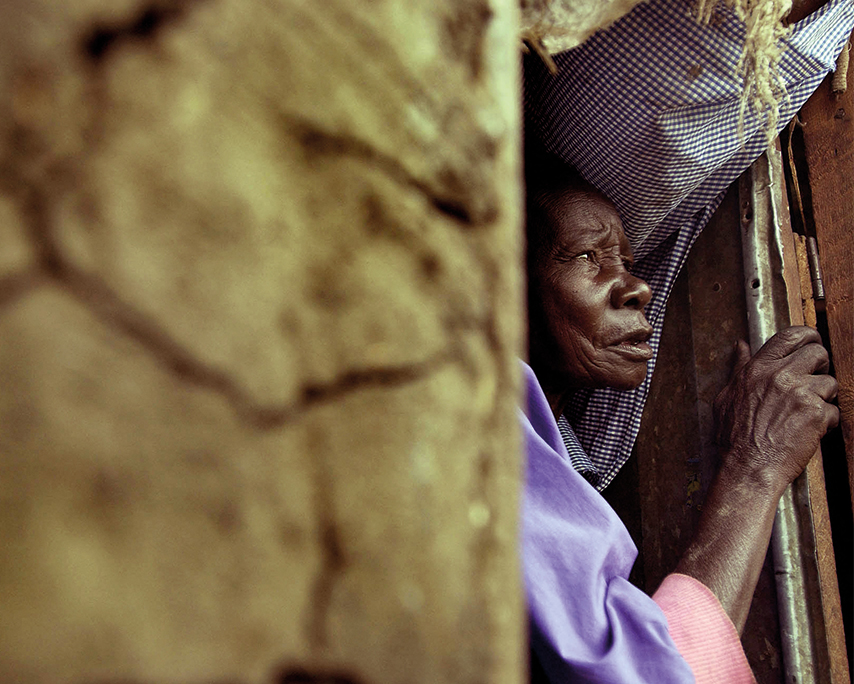An elderly Congolese woman looks out from her hut. Thanks to advances in medicine, better nutrition, and overall improvements in living standards, people are living longer than ever before. By 2050, one in six people will be over 65 years old.
Photo Credit: Jose Cendon/AFP via Getty Images
International Day of Older Persons
Understanding global ageing policies
The world is getting older. Thanks to advances in medicine, better nutrition, and overall improvements in living standards, people are living longer than ever before. At the same time, birth rates are falling in many countries. The result is a demographic shift in which societies everywhere are witnessing a growing proportion of older people. This change comes with both opportunities and challenges. To manage it, global frameworks have been developed to guide governments and communities in their responses to the issue. Two of the most important are the Madrid International Plan of Action on Ageing (MIPAA), adopted in 2002, and the UN Decade of Healthy Ageing (2021–2030).
Although both deal with ageing, they do so in different ways. To understand their roles, it is helpful to examine them from several angles.
Setting the foundation: MIPAA (2002)
The Madrid International Plan of Action on Ageing was the first global framework of its kind. Agreed upon by United Nations member states in 2002, it pushed governments to take ageing seriously in their national policies. In practice, this meant reviewing pension systems, ensuring older people could access social services, protecting their legal rights, and promoting their participation in society.
Think of MIPAA as laying the groundwork for future initiatives. It is a guiding document that urged countries to integrate ageing into development planning. It also highlighted the importance of dignity, independence, and equality for older persons. While health was included, it was viewed as one of several areas, alongside income security, housing, and social inclusion, that required attention and consideration.
One of the strengths of MIPAA is its emphasis on human rights. It made it clear that older people should not be seen as passive recipients of care, but as active citizens with a valuable role in their families and communities.
Moving into action: The UN Decade of healthy ageing (2021-2030)
Fast forward nearly two decades, and the world is older still. This is where the UN Decade of Healthy Ageing comes in. Launched in 2021, this is a time-bound initiative that will run until 2030, aligning with the Sustainable Development Goals. Its purpose is to translate the principles outlined in earlier frameworks, such as MIPAA, into concrete action.
The focus here is on improving the lives of older people, their families, and their communities. Health takes centre stage. The Decade calls for efforts to build age-friendly cities, tackle ageism in health systems, provide access to long-term care, and support family caregivers. It is not only about policy statements, but also about creating measurable change in the quality of life for older adults.
Another difference is the emphasis on collaboration. While MIPAA primarily guided national governments, the Decade of Healthy Ageing brings together a diverse range of partners, including international agencies, civil society groups, researchers, and the private sector. The idea is that ageing is a global issue, and no single country can manage it alone.
Seen together, the two frameworks are not in competition; instead, they complement each other. MIPAA provided the vision and foundation, making ageing visible on the policy agenda and emphasising the rights and dignity of older persons. The Decade of Healthy Ageing builds on that base, focusing on action, collaboration, and measurable impact.
For ordinary people, what does this mean? It means there is growing global recognition that older people matter, not just as individuals needing care, but as full members of society whose contributions are vital. It also means that policies and initiatives are being developed to make communities more age-friendly, healthcare more inclusive, and societies more prepared for the future.
By 2050, one in six people worldwide will be over 65. Preparing for this future is necessary. Frameworks like MIPAA and the Decade of Healthy Ageing give governments and communities the tools to respond. They remind us that ageing is not a burden but a natural part of life. With the right policies and practices, societies can make ageing not just about living longer, but about living well.



